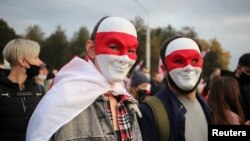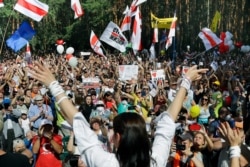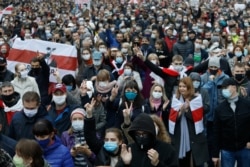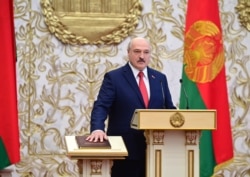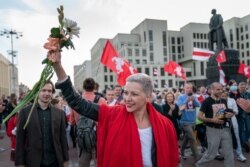Belarus’s opposition called a countrywide general strike on Monday — the latest in a series of efforts to dislodge longtime leader Alexander Lukashenko from power following what opponents say was a rigged presidential election in the former Soviet republic last August.
Svetlana Tikhanovskaya — Lukashenko’s primary opponent in the race and who fled the country under state pressure following the vote — threatened the strike two weeks ago in an effort to reinvigorate the protest movement.
Her demands: Lukashenko resign, end police violence against demonstrators, and free hundreds of political prisoners or face a national work stoppage.
On Monday, the independent media site Tut.by posted photos of workers striking at several key factories. The news service also reported dozens of workers detained at the Grodno Azot factory for joining the strike.
Nexta, a social media platform, published pictures of university students in Minsk blocking the entrance to the Belarus State University.
A number of employees could be seen gathered outside the offices of the A1 company I Minsk holding the opposition’s trademark Red and White flags.
However, the prime minister's spokeswoman said all the country's major industrial companies were working normally — a notion Tikhanovskaya’s spokeswoman argued was mere government spin.
“The authorities are nervous,” said spokeswoman Anna Krasulina.
The people’s ultimatum
The so-called “People’s Ultimatum” expired as tens of thousands of demonstrators took the streets of Belarus again on Sunday — the 11th straight weekend of mass protests aimed at ending Lukashenko’s quarter century hold on power.
Yet once again, Lukashenko’s security troops and riot police were out in force.
Central metro stations were closed in advance — forcing people to walk towards the city center.
Crowds chanting “Strike, Strike, Strike” were met with stun grenades, rubber bullets, and tear gas as they closed in on Lukashenko’s residence — sending protesters running for cover.
The Interior Ministry also reported demonstrators had thrown rocks and broken windows outside a police headquarters in central Minsk. The damage did not appear to be widespread.
Meanwhile, the human rights group Vesna reported more than 300 protesters arrested — adding to the estimated 8,000 detained in the wake of the vote.
On social media, a widely shared video showed masked security guards terrorizing protesters who had fled into a nearby apartment.
Credible allegations of torture and beatings at the hands of security forces have become commonplace.
Lukashenko has refused to step down — arguing he won the election in a landslide with 80% of the vote.
He also has backing from his neighbor Russia, which seeks to maintain a predictable ally in charge along its western border.
Kremlin spokesman Dmitry Peskov implied Russia was growing concerned about the strike’s ability to impact Russia’s economy — noting the two economies were integrated “at the highest levels.”
“For us, it’s extremely important how rhythmically and reliably the Belarus factories function,” added Peskov.
President Vladimir Putin has provided both economic aid and assurances of military support if necessary. In another sign of Moscow’s careful watch over events in Belarus, Sergei Narishkin, the head of Russia’s external intelligence services, was in Minsk to meet with Lukashenko last week.
Meanwhile, the U.S. and other Western governments have denounced the violence against demonstrators and backed sanctions on the Lukashenko regime — with the European Union declaring it no longer saw Lukashenko as the head of Belarus.
French President Emanuel Macron and German Chancellor Angela Merkel are among European leaders who have met with Tikhanovskaya directly.
Washington calling
In a separate development, U.S. Secretary of State Mike Pompeo spoke with Lukashenko by phone on Saturday — the first publicly known high-level contact between the U.S. and the embattled Belarusian leader since the political crisis began.
Secretary Pompeo had been behind recent U.S. efforts to improve relations with Minsk — even meeting with Lukashenko during a high profile visit to Minsk last February.
According to the State Department, Pompeo “reaffirmed U.S. support for the democratic aspirations of the people of Belarus” and demanded the release and evacuation of Vitali Shkliarov, 44, a Belarusian-American political analyst who was arrested ahead of the August vote while visiting his parents in Grodno.
Authorities have charged Shkliarov with helping organize illegal rallies for the opposition — and presented his case as evidence of western meddling in Belarus.
Responding to Pompeo, Belarus state television issued a statement saying the country — together with Russia — was “ready to jointly respond to emerging external threats.”
“By mutual opinion, after Pompeo’s February visit to Minsk, the situation has changed dramatically, new challenges have arisen and are emerging,” concluded the statement.
In a recent twist to the Shkliarov case, Lukashenko ordered the American released from detention and placed under house arrest last week. Shkliarov had been suffering from health problems while in prison.
The decision followed a surprise visit by Lukashenko to a Minsk prison to meet with jailed opposition figures to discuss constitutional reforms — with state television cameras in tow.
Two other businessmen with ties to the opposition were also released following the meeting — in what appeared an attempt to divide opposition loyalties.
Other key members — most notably, Tikhanovskaya’s husband Sergei Tikhanovsky and her campaign ally Maria Kolesnikova — were not part of the talks and remain in custody.
In recent days, Kolesnikova issued a letter from prison saying Lukashenko’s security forces were threatening to jail her for the next 25 years.




